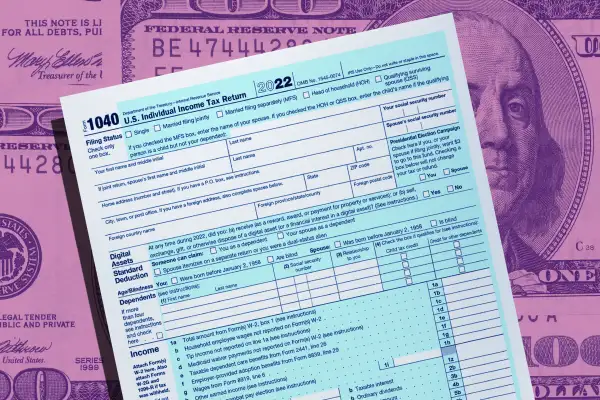6 Major Tax Changes That Could Affect Your Return and Refund in 2023

The world is finally starting to return to normal three years after being disrupted by COVID-19, and taxes are no exception. As millions of Americans file their 2022 federal income taxes, they’re dealing with a slew of newly expired pandemic policies.
Several special rules aimed at helping folks stay afloat amid the economic turbulence in 2020 and 2021 ran their course in 2022. In their place, Congress passed another round of special policies aimed at helping folks cope with inflation.
This is routine; Congress and the IRS make changes to taxes every year. But this time around, those tweaks may feel particularly significant for folks who have become accustomed to getting hefty refunds. Kathy Pickering, chief tax officer at H&R Block, says it’s important for taxpayers to be aware of — and be prepared for — these policy changes.
IRS tax changes
Most tax preparers and tax software programs will automatically incorporate the latest changes, but it certainly can’t hurt to double-check behind them. As always, to get your refund as quickly as possible, it's also more important than ever to file your taxes accurately and electronically.
Here are some of the big changes you should know for this year’s tax filing season.
1. The income thresholds increased
Each fall, the IRS shifts its tax brackets (along with a bunch of other provisions) in response to inflation. Price increases are slowly starting to come down, but the past few years have seen a ton of inflation records broken, so the agency made some adjustments to the income thresholds that determine which tax bracket you fall under.
Remember: The U.S. uses a graduated-rate structure, so the bracket that corresponds to your salary isn’t how much you owe on all of your money. You’re taxed according to the portion(s) of your income that fall into each bracket.
2. The standard deduction is higher
Since the passage of the Tax Cuts and Jobs Act of 2017, the vast majority of taxpayers take the standard deduction, a set amount of income that the IRS allows you to exclude from taxes.
For the 2022 tax year, the standard deduction rose to $12,950 for single filers, up $400 from the year before. It’s $25,900 for married couples filing jointly (an $800 increase).
3. There are no federal stimulus checks to deal with
The federal government sent out its final COVID-19 stimulus checks in March 2021 and encouraged people who never received them to claim the recovery rebate credit on that year's taxes. Now that’s done and dusted.
The only stimulus checks you need to worry about on your 2022 taxes are state ones. After a bit of confusion, the IRS decided last month that most recipients don’t need to bother with reporting relief payments as income. In most states, the rebates were categorized as welfare payments or disaster relief money, meaning they’re not taxable.
That said, taxpayers who got state stimulus funds in Georgia, Massachusetts, South Carolina and Virginia may want to read the fine print. Those recipients may be taxed in certain situations.
4. The child tax credit is back to normal
Congress temporarily expanded the child tax credit in 2021 to allow families to claim up to $3,600 per kid. But it didn't renew the expansion, so the child tax credit has returned to $2,000 per dependent.
That’s not all: The earned income tax credit and the maximum child and dependent care credit both decreased, too. On another note, the special $300 charitable deduction — which was extended even to taxpayers who didn’t itemize — ran out.
All of these pandemic policy changes are leading to unexpected balances for taxpayers, says Mark Steber, chief tax information officer at Jackson Hewitt.
“The amount of people that are owing is doubling,” he adds. “A lot of people got used to $3,000 refunds, and now they either get no refund or they owe.”
5. Some clean energy credits changed
TaxBuzz’s Lee Reams points out that the Inflation Reduction Act, which President Joe Biden signed in August, modified a bunch of rules around environmentally friendly tax credits.
Although most didn’t take effect until this January and therefore won't affect your taxes until next year, there are a few exceptions. The enhanced residential clean energy credit applies to eligible projects (like solar panel installations) that were completed anytime in 2022. Congress also tweaked the electric vehicle tax credit; cars purchased after August now have to be assembled in North America to qualify.
6. Your refund might be lower
The IRS has been warning people since November that their tax refunds are going to be lower than normal. Early data shows that these alerts were sent for good reason: As of Feb. 17, the average refund was down 11% ($3,140 versus $3,536 in 2022).
There's no guarantee your refund will be timely, either. In a news release, the IRS also warned taxpayers “not to rely on receiving a 2022 federal tax refund by a certain date especially when making major purchases or paying bills,” likely to head off complaints about delays.
Keep in mind
Steber’s advice is to focus less on the legislative fine print and more on personal changes that affect my taxes. Did you buy a house? Get married? Get divorced? Have a baby? Adopt a child? Take on a side gig? Become a caregiver? Go back to school?
These milestones have bigger implications than any new (or lapsed) government policy.
“Life changes drive more impact on a tax return,” he says.
